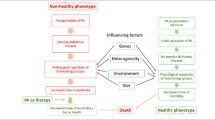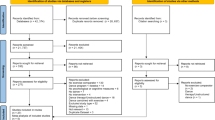Abstract
Rheumatologic diseases (e.g., fibromyalgia, osteoarthritis, and rheumatoid arthritis) consist of a complex interplay between biologic and psychological aspects, resulting in therapeutically challenging chronic conditions to control. Encouraging evidence suggests that Tai Chi, a multi-component Chinese mind–body exercise, has multiple benefits for patients with a variety of chronic disorders, particularly those with musculoskeletal conditions. Thus, Tai Chi may modulate complex factors and improve health outcomes in patients with chronic rheumatologic conditions. As a form of physical exercise, Tai Chi enhances cardiovascular fitness, muscular strength, balance, and physical function. It also appears to be associated with reduced stress, anxiety, and depression, as well as improved quality of life. Thus, Tai Chi can be safely recommended to patients with fibromyalgia, osteoarthritis, and rheumatoid arthritis as a complementary and alternative medical approach to improve patient well-being. This review highlights the current body of knowledge about the role of this ancient Chinese mind–body medicine as an effective treatment of rheumatologic diseases to better inform clinical decision-making for our patients.
Similar content being viewed by others
References
Papers of particular interest, published recently, have been highlighted as: • Of importance, •• Of major importance
Barnes PM, Bloom B, Nahin RL. Complementary and alternative medicine use among adults and children: United States. Natl Health Stat Report. 2007;2009:1–23.
Birdee GS, Wayne PM, Davis RB, et al. T'ai chi and qigong for health: patterns of use in the United States. J Altern Complement Med. 2009;15:969–73.
Yan JH, Downing J. Tai Chi. J Aging Phys Activity. 1998;6:350–62.
Wang C, Collet JP, Lau J. The effect of Tai Chi on health outcomes in patients with chronic conditions: a systematic review. Arch Intern Med. 2004;164:493–501.
• Wang C, Raveendhara B, Ramel J, et al. Tai Chi on psychological well-being: systemic review and meta-analysis. BMC Complementary and Alternative 2010;23: 1186–1472. This comprehensive review and meta-analysis summarizes and updates results of the effects of Tai Chi exercise on health outcomes in terms of psychological effects in various populations.
•• Wang C, Schmid C, Rones R, et al. Tai Chi is effective in treating fibromyalgia: a randomized controlled trial. N Engl J Med. 2010;363: 743–54. This is the first randomized, controlled trial that shows that tai chi is potentially a useful therapy for patients with fibromyalgia.
Wang C, Schmid CH, Hibberd PL, et al. Tai Chi is effective in treating knee osteoarthritis: a randomized controlled trial. Arthritis Rheum. 2009;61:1545–53.
Wang C. Tai Chi improves pain and functional status in adults with rheumatoid arthritis: results of a pilot single-blinded randomized controlled trial. Med Sport Sci. 2008;52:218–29.
•• Jones KD, Sherman CA, Mist SD. A randomized controlled trials of 8-form Tai Chi improves symptoms and functional mobility in fibromyalgia patients. Clin Rheumatol 2012;31:1205–1214. A large parallel-group, randomized controlled trial confirmed previous beneficial results of tai Chi for fibromyalgia while focusing on functional mobility.
Felson DT. Clinical practice. Osteoarthritis of the knee. N Engl J Med. 2006;354:841–8.
Rejeski WJ, Miller ME, Foy C, et al. Self-efficacy and the progression of functional limitations and self-reported disability in older adults with knee pain. J Gerontol B Psychol Sci Soc Sci. 2001;56:S261–265.
Axford J, Heron C, Ross F, et al. Management of knee osteoarthritis in primary care: pain and depression are the major obstacles. J Psychosom Res. 2008;64:461–7.
Fransen M, Nairn L, Winstanley J, et al. Physical activity for osteoarthritis management: a randomized controlled clinical trial evaluating hydrotherapy or Tai Chi classes. Arthritis Rheum. 2007;57:407–14.
Brismee JM, Paige RL, Chyu MC, et al. Group and home-based tai chi in elderly subjects with knee osteoarthritis: a randomized controlled trial. Clin Rehabil. 2007;21:99–111.
Song R, Roberts BL, Lee EO, et al. A randomized study of the effects of t'ai chi on muscle strength, bone mineral density, and fear of falling in women with osteoarthritis. J Altern Complement Med. 2010;16:227–33.
Low S, Ang LW, Goh KS, et al. A systematic review of the effectiveness of Tai Chi on fall reduction among the elderly. Arch Gerontol Geriatr. 2009;48:325–31.
•• Li, FZ, Harmer, P, Fitzgerald, K et al. Tai Chi and Postural Stabilityin Patients with Parkinson's Disease. N Engl J Med 2012;366:511–519. The results of this first randomized clinical trial show that a program of twice-weekly tai chi for 24 weeks is more effective than low-intensity, low-impact exercise programs in alleviating the symptoms of Parkinson's disease and improving functional ability.
Bannuru RR, Samuel A, Wang C. How effective is Tai Chi mind-body therapy for knee osteoarthritis? A systematic review and meta-Analysis. Osteoarthritis Cartilage. 2012;20:S281.
Abariga SA, Wang C. Tai Chi and Health Related Quality of Life in patients with Chronic Conditions: A systematic review and meta-analysis of randomized controlled trials. International Research Congress on Integrative Medicine and Health. 2012;P04.29.
Klareskog L, Catrina AI, Paget S. Rheumatoid arthritis. Lancet. 2009;373:659–72.
Symmons DP, Jones MA, Scott DL, et al. Longterm mortality outcome in patients with rheumatoid arthritis: early presenters continue to do well. J Rheumatol. 1998;25:1072–7.
Michel BA, Bloch DA, Fries JF. Predictors of fractures in early rheumatoid arthritis. J Rheumatol. 1991;18:804–8.
Keefe FJ, Somers TJ, Martire LM. Psychologic interventions and lifestyle modifications for arthritis pain management. Rheum Dis Clin North Am. 2008;34:351–68.
Lee EO. Effects of a Tai-Chi program on pain, sleep disturbance, mood and fatigue in rheumatoid arthritis patients. Journal of muscle and joint health. 2005;12:57–68.
Lee KY, Jeong OY. The effect of Tai Chi movement in patients with rheumatoid arthritis. Taehan Kanho Hakhoe Chi. 2006;36:278–85.
Uhlig T, Larsson C, Hjorth AG, et al. No improvement in a pilot study of tai chi exercise in rheumatoid arthritis. Ann Rheum Dis. 2005;64:507–9.
Uhlig T, Fongen C, Steen E, et al. Exploring Tai Chi in rheumatoid arthritis: a quantitative and qualitative study. BMC Musculoskelet Disord. 2010;11:43.
Kirsteins AE, Dietz F, Hwang SM. Evaluating the safety and potential use of a weight-bearing exercise, Tai-Chi Chuan, for rheumatoid arthritis patients. American Journal of Physical Medical Rehabilitation. 1991;70:136–41.
Van Deusen J, Harlowe D. The efficacy of the ROM dance program for adults with rheumatoid arthritis. Am J Occup Ther. 1987;41:90–5.
Jiang JG, Haiqin Q. A controlled study of San Pi Tang deconction with exercise in the treatment of rheumatoid arthritis. Journal of Integrated Chinese Traditional Medicine with Western Medicine. 1999;19:588.
Han A, Robinson V, Judd M, et al. Tai chi for treating rheumatoid arthritis. Cochrane Database Syst Rev 2004:CD004849,
Yeh GY, Wang C, Wayne PM, et al. The effect of tai chi exercise on blood pressure: a systematic review. Prev Cardiol. 2008;11:82–9.
•• Yeh GY, McCarthy EP, Wayne PM, et al. Tai chi exercise in patients with chronic heart failure: a randomized clinical trial. Arch Intern Med. 2011;171:750–757. In this high quality clinical trial, the researchers found that the participants with chronic heart failure in the 12 weeks of tai chi had clinically significant improvements in quality of life, mood, and exercise self-efficacy when compared with the education group. The study confirmed previous results about Tai Chi Exercise Prescription In Chronic Disease.
Woo J, Hong A, Lau E, et al. A randomized controlled trial of Tai Chi and resistance exercise on bone health, muscle strength and balance in community-living elderly people. Age Ageing. 2007;36:262–8.
Shen CL, Williams JS, Chyu MC, et al. Comparison of the effects of Tai Chi and resistance training on bone metabolism in the elderly: a feasibility study. Am J Chin Med. 2007;35:369–81.
Chan K, Qin L, Lau M, et al. A randomized, prospective study of the effects of Tai Chi Chun exercise on bone mineral density in postmenopausal women. Arch Phys Med Rehabil. 2004;85:717–22.
Qin L, Au S, Choy W, et al. Regular Tai Chi Chuan exercise may retard bone loss in postmenopausal women: a case–control study. Arch Phys Med Rehabil. 2002;83:1355–9.
Qin L, Choy W, Leung K, et al. Beneficial effects of regular Tai Chi exercise on musculoskeletal system. J Bone Miner Metab. 2005;23:186–90.
• Wayne PM, Kiel DP, Buring JE, et al. Impact of Tai Chi exercise on multiple fracture-related risk factors in post-menopausal osteopenic women: a pilot pragmatic, randomized trial. BMC Complementary and Alternative Medicine 2012;12:7. In a pragmatic randomized trial, the authors observed a clinically relevant trend of Tai Chi training attenuating bone loss and improving quality of life in postmenopausal osteopenic women. The results contribute to a growing literature evaluating Tai Chi for bone health and fall-related fracture risk.
Acknowledgments
Dr. Wang is supported in part by the National Center for Complementary and Alternative Medicine (NCCAM). The contents of this manuscript are solely the responsibility of the authors and do not necessarily represent the official views of NCCAM or the National Institutes of Health (NIH). The sponsors had no role in the design and conduct of the mentioned studies; collection, management, analysis, and interpretation of the data; and preparation, review or approval of the manuscript.
Disclosure
No potential conflicts of interest relevant to this article were reported.
Author information
Authors and Affiliations
Corresponding author
Rights and permissions
About this article
Cite this article
Wang, C. Role of Tai Chi in the Treatment of Rheumatologic Diseases. Curr Rheumatol Rep 14, 598–603 (2012). https://doi.org/10.1007/s11926-012-0294-y
Published:
Issue Date:
DOI: https://doi.org/10.1007/s11926-012-0294-y




